最新新概念英语第一册Lesson75~84课文注释
(完整版)新概念英语第一册第75-76课-Uncomfortableshoes
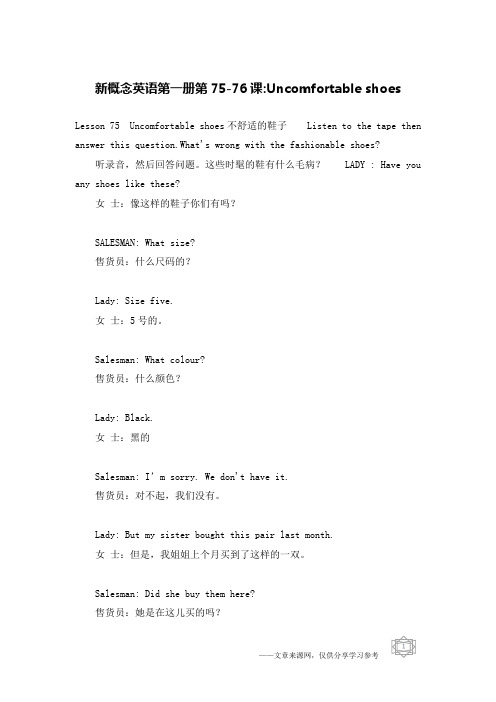
新概念英语第一册第75-76课:Uncomfortable shoesLesson 75 Uncomfortable shoes不舒适的鞋子Listen to the tape then answer this question.What's wrong with the fashionable shoes?听录音,然后回答问题。
这些时髦的鞋有什么毛病?LADY : Have you any shoes like these?女士:像这样的鞋子你们有吗?SALESMAN: What size?售货员:什么尺码的?Lady: Size five.女士:5号的。
Salesman: What colour?售货员:什么颜色?Lady: Black.女士:黑的Salesman: I’m sorry. We don't have it.售货员:对不起,我们没有。
Lady: But my sister bought this pair last month.女士:但是,我姐姐上个月买到了这样的一双。
Salesman: Did she buy them here?售货员:她是在这儿买的吗?Lady: No, she bought them in the U.S.女士:不。
她是在美国买的。
Salesman: We had some shoes like those a month ago, but we haven’t any now.售货员:一个月前我们有这样的鞋。
但是现在没有了。
Lady: Can you get a pair for me please?女士:您能为我找一双吗?Salesman: I’m afraid that I can’t. They were in fashion last year and the year before last.But they’re not in fashion this year.售货员:恐怕不行。
新概念第一册第75课-不舒服的鞋子-Lesson-75-Uncomfortable-shoes
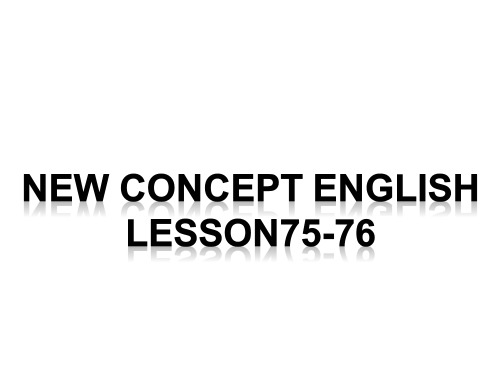
was did swam gave drank lost spoke took went saw said ate met put read cut
understandsmiledgo
drankgreetateshaved
putfindopenedspeak
didsaytookcutread
buy v. 买 (bought)
• My father bought me iphone 6 esterday. • pair n. 双,对 • a pair of 一双,一对
• a pair of jeans 一条裤子 • a pair of socks 一双袜子 • a pair of stockings 一双长筒袜 • a pair of glasses 一副眼镜
said that they w_e_r_e_ very uncomfortable, but women alwaysw_o_r_e_ uncomfortable
shoes!
Now
Before
this week last week this week before last this month last month this month before last this year last year the year before last
Then, the shop assistant showed her a pair of shoes ands_a_id__, "These shoes are in fashion now. " The lady said, "But theylo_o_k__ very uncomfortable." The shop assistant
新概念英语第一册第75-76课内容详解

新概念英语第一册第75-76课内容详解新概念英语第一册第75-76课内容详解导语:喜欢穿漂亮鞋子是人的本性,但是再漂亮的鞋子不适合穿,就没有必要再穿了。
下面是一篇关于不适合的鞋子的英语课文,欢迎大家学习。
Lesson 75 Uncomfortable shoes不舒适的鞋子Listen to the tape then answer this question.What's wrong with the fashionable shoes?听录音,然后回答问题。
这些时髦的鞋有什么毛病?LADY : Have you any shoes like these?女士:像这样的鞋子你们有吗?SALESMAN: What size?售货员:什么尺码的?Lady: Size five.女士:5号的。
Salesman: What colour?售货员:什么颜色?Lady: Black.女士:黑的Salesman: I’m sor ry. We don't have it.售货员:对不起,我们没有。
Lady: But my sister bought this pair last month.女士:但是,我姐姐上个月买到了这样的一双。
Salesman: Did she buy them here?售货员:她是在这儿买的吗?Lady: No, she bought them in the U.S.女士:不。
她是在美国买的。
Salesman: We had some shoes like those a month ago, but we haven’t any now.售货员:一个月前我们有这样的鞋。
但是现在没有了。
Lady: Can you get a pair for me please?女士:您能为我找一双吗?Salesman: I’m afraid that I can’t. They were in fashion last year and the year before last.But they’re not in fashion this year.售货员:恐怕不行。
新概念第一册第75课 不舒服的鞋子 Lesson 75 Uncomfortable shoes
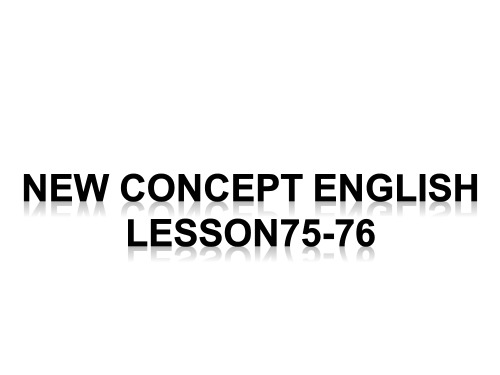
• LADY: Black. • SHOP ASSISTANT: I'm sorry. We don't have any.
LADY: But my sister bought this pair last month. • Buy-bought • Pair • a pair of shoes / trousers
fashionable
• fashion.n.流行 • in fashion • out of fashion
US5的话是34.5码
7.20.2015
7.20.2014
7.20.2013
• Mar.21st 2015
2015
2014
• What does the lady show to the shop assistant? • A pair of shoes. • Why does she show him those shoes? • Because she wants a pair like them. • Where did her sister buy those shoes? • In the U.S. • When did the shop have some shoes like these? • A month ago. • Can they get any shoes like those now,
SHOP ASSISTANT: Did she buy them here?
• did + 动词原形
LADY: No, she bought them in the U.S.
• 省略一句话 • No, she didn’t buy them here. • She bought them in the U.S.
新概念英语第一册75课课文

新概念英语第一册75课课文Lesson 75: A polite request (一次礼貌的请求)In Lesson 75, we learn about the importance of making polite requests in English. Politeness is a crucial aspect of communication, and mastering the art of making requests politely can greatly enhance our interactions with others. The lesson begins with Mr. Jackson, an English teacher, asking one of his students, Tom, to lend him a pen. Instead of simply saying, 'Tom, give me a pen,' Mr. Jackson opts for a more polite approach. He says, 'Tom, would you be so kind as to lend me your pen?'By using phrases like 'would you be so kind' and 'as to lend me,' Mr. Jackson shows respect towards Tom and avoids sounding demanding. Polite requests like this create a positive atmosphere and encourage others to willingly assist.Let's explore some other examples of making polite requests:1. 'Excuse me, could you please pass me the salt?' - Instead of demanding someone to pass the salt, adding 'excuse me' and 'please' shows consideration for the other person's willingness to help.2. 'Would it be possible for you to help me with this task?'- This phrase acknowledges that the person may have other commitments but politely asks for assistance.3. 'I was wondering if you could possibly lend me your car for the weekend?' - By using phrases like 'I was wondering' and 'could possibly,' the request is presented in a more tentative manner, giving the person the option to decline.4. 'If it's not too much trouble, could you please email me the report by tomorrow?' - By acknowledging that the request might be burdensome, the person making the request shows understanding and appreciation for any effort made.Remember, it's not just about the words we choose but also about our tone and body language. Making eye contact, using a gentle tone, and being patient can further enhance the politeness of our requests.Learning to make polite requests in English not only helps us communicate effectively but also fosters positive relationships with others. It shows our respect for their time and willingness to assist, creating an environment of mutual understanding and cooperation.So, let's practice making polite requests and make our interactions more pleasant and respectful.。
新概念第一册75课
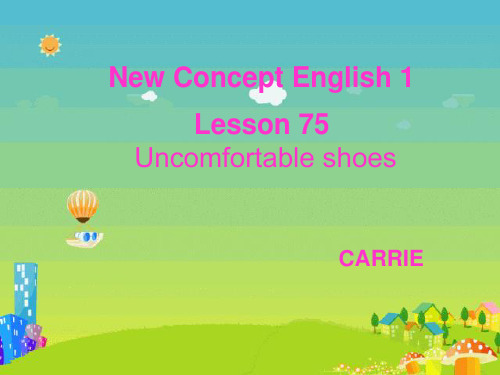
•
two pairs of ......(看作复数)
• 5、Did she buy them here? ← She bought them here.
• 【回想】一般过去时的陈述句变一般疑问 句的方法。
• 这里的them代指the shoes,所以是复数。 如果用单数,可以说Did she buy this pair here?
• 流行的 popular ,fashionable, • He is a popular star.
• 11、the year before last →last year →this year →next year→ the year after next
•
过去时 → 过去时→ 现在时 → 将来时
• 前半句话意义完整,后半句话承前省略。
• 前半句话是一般过去时(...ago),后半句话是一 般现在时(now)。
• 前半句话是肯定句(some),后半句话是否定 句(any)。
• 举例:Long long ago, there lived a monk.... 很 久很久以前,有一个和尚。。。
• 7、We had some shoes like those a month ago, but we don’t have any (shoes like those) now.
• LADY: Can you get a pair for me, please?
• SHOP ASSISTANT : I’m afraid that I can’t . They were in fashion last year and the year before last . But they’re not in fashion this year .
新概念第一册第75课

课文讲解
3. ago adv. 以前 ago 用于一般过去时;
I went to London three days ago. 我三天前去的伦敦。
She left thirty minutes ago. 她30分钟前分开的。
22
课文讲解
A minute
An hour
A day
ago
A week
A month
A year
23
课文讲解
Two minutes
Five hours
Three days
ago
Two weeks
Four monthsSix y源自ars24课文讲解
4. pair n. 双,对 a pair of
shoes/socks/jeans/trousers/glasses/sci ssors〔看作单数〕 two pairs of ......〔看作复数〕
Red is in fashion this winter.
26
课文讲解
6. ★ I’m afraid that I can’t. 宾语从句。 ➢afraid [adj.] 恐怕的、害怕的。 ➢ 例句:I’m afraid that I can’t help you.
27
课文讲解
在英语中,宾语一般是名词或代词,宾语一 般是跟在动词后。 I want an apple. I love you.
4
复习副词
2. 以辅音字母加y结尾的形容词要变y为i,然 后再加-ly。
busy-busily; angry-angrily;
5
复习副词
3.某些以辅音字母加不发音的字母e结尾和以 -ue结尾的形容词要先去掉e,然后再加-y或ly。
新概念英语第一册第75-76课:Uncomfortable shoes
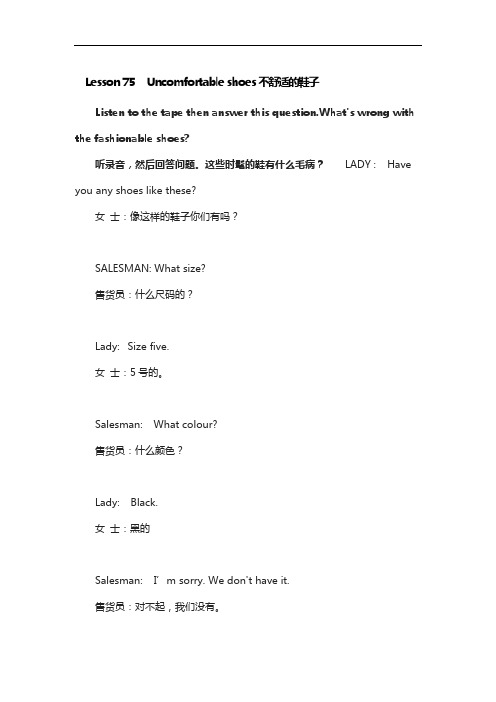
Lesson 75 Uncomfortable shoes不舒适的鞋子Listen to the tape then answer this question.What's wrong with the fashionable shoes?听录音,然后回答问题。
这些时髦的鞋有什么毛病?LADY : Have you any shoes like these?女士:像这样的鞋子你们有吗?SALESMAN: What size?售货员:什么尺码的?Lady: Size five.女士:5号的。
Salesman: What colour?售货员:什么颜色?Lady: Black.女士:黑的Salesman: I’m sorry. We don't have it.售货员:对不起,我们没有。
Lady: But my sister bought this pair last month.女士:但是,我姐姐上个月买到了这样的一双。
Salesman: Did she buy them here?售货员:她是在这儿买的吗?Lady: No, she bought them in the U.S.女士:不。
她是在美国买的。
Salesman: We had some shoes like those a month ago, but we haven’t any now.售货员:一个月前我们有这样的鞋。
但是现在没有了。
Lady: Can you get a pair for me please?女士:您能为我找一双吗?Salesman: I’m afraid that I can’t. They were in fashion last year and the year before last.But they’re not in fashion this year.售货员:恐怕不行。
这鞋在去年和前年时兴,而今年已不流行了。
新概念英语第一册第75课

新概念英语第一册第75课摘要:1.新概念英语第一册第75 课概述2.课程主题:过去进行时3.课程内容:语法讲解与实践4.课程结构:语法讲解、例句、练习5.课程总结:过去进行时的用法及注意事项正文:新概念英语第一册第75 课的主题是过去进行时,这是一节关于英语语法的课程。
课程内容丰富,既有理论知识的讲解,也有实际应用的练习,帮助学生更好地掌握和运用过去进行时这一语法知识。
课程开始,老师首先对过去进行时进行了概述。
过去进行时表示在过去某一特定时间正在进行的动作或存在的状态。
过去进行时的构成是:主语+ was/were + 动词的ing 形式。
其中,"was"用于第一人称和第三人称单数,"were"用于第二人称和第三人称复数。
接下来,老师详细讲解了过去进行时的语法规则和用法。
过去进行时表示过去某个时间点正在进行的动作,常常和表示过去的时间状语连用,如:at 7 o"clock last night, was reading a book.表示在过去一段时间内正在进行的动作,常常和表示一段时间的状语连用,如:I was studying English from 7 to 9 last night.课程中,老师列举了许多例句,帮助学生更好地理解过去进行时的用法。
例如:When I arrived, they were having dinner.(当我到达时,他们正在吃晚饭。
)I was working in the garden when it started to rain.(我开始下雨时正在花园里工作。
)课程的最后,老师设计了一些练习,让学生通过实际操作来检验自己对过去进行时的掌握程度。
这些练习包括填空题、选择题和句子改写等,内容丰富且具有针对性。
总的来说,新概念英语第一册第75 课对过去进行时这一语法知识进行了全面、深入的讲解,既有理论知识的传授,也有实际应用的训练。
新概念英语第一册Lesson75~84课文注释
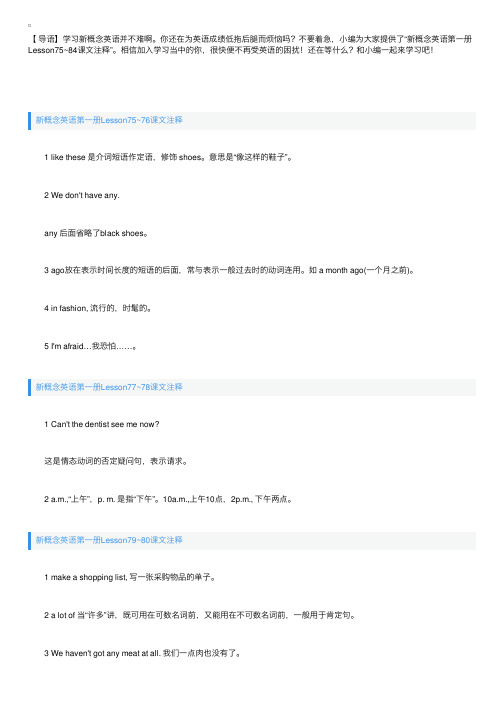
【导语】学习新概念英语并不难啊。
你还在为英语成绩低拖后腿⽽烦恼吗?不要着急,⼩编为⼤家提供了“新概念英语第⼀册Lesson75~84课⽂注释”。
相信加⼊学习当中的你,很快便不再受英语的困扰!还在等什么?和⼩编⼀起来学习吧!新概念英语第⼀册Lesson75~76课⽂注释 1 like these 是介词短语作定语,修饰 shoes。
意思是“像这样的鞋⼦”。
2 We don't have any. any 后⾯省略了black shoes。
3 ago放在表⽰时间长度的短语的后⾯,常与表⽰⼀般过去时的动词连⽤。
如 a month ago(⼀个⽉之前)。
4 in fashion, 流⾏的,时髦的。
5 I'm afraid…我恐怕……。
新概念英语第⼀册Lesson77~78课⽂注释 1 Can't the dentist see me now? 这是情态动词的否定疑问句,表⽰请求。
2 a.m.,“上午”,p. m. 是指“下午”。
10a.m.,上午10点,2p.m., 下午两点。
新概念英语第⼀册Lesson79~80课⽂注释 1 make a shopping list, 写⼀张采购物品的单⼦。
2 a lot of 当“许多”讲,既可⽤在可数名词前,⼜能⽤在不可数名词前,⼀般⽤于肯定句。
3 We haven't got any meat at all. 我们⼀点⾁也没有了。
at all 这个词组⽤在否定句中,表⽰“丝毫”、“⼀点”、“根本”的意思,有强调作⽤。
have got 与 have(“有”)同义。
4 many 和 much 均可译成“许多”,但⽤法不同: many 主要⽤于疑问句和否定句中,放在可数名词之前,如 many tomatoes; much ⽤于疑问句和否定句中,放在不可数名词之前,如 much tea, much money。
新概念英语第⼀册Lesson81~82课⽂注释 1 在第13课中我们见到了这样的句⼦:Come upstairs…, 其中的 upstairs 表⽰动作的⽅向。
新概念第一册75课

• 4、But my sister bought this pair (of shoes) last month. 省略句。
• but 可是,但是,不过。连词,表转折。
• bought是buy的过去式。last month是一般 过去时的标志。
• 双,对,副:a pair of
shoes/socks/jeans/trousers/glasses/scisso rs(看作单数)
久很久以前,有一个和尚。。。
11
• 7、We had some shoes like those a month ago, but we don’t have any (shoes like those) now.
• 前半句话意义完整,后半句话承前省略。 • 前半句话是一般过去时(...ago),后半句
5
课文分析
1、Do you have any shoes like these? • 肯定句中用some,否定句和疑问句中用
any • like 像…一样。介词。Throw the risbee
like this.
6
• 2、-What size? -Size five. -What colour? -Black.
New Concept English 1 Lesson 75
Uncomfortable shoes
CARRIE
1
What’s wrong with the fashionable shoes?
• 这些时髦的鞋子有什么毛病?
2
• LADY: Do you have any shoes like these? • SHOP ASSISTANT : What size? • LADY: Size five. • SHOP ASSISTANT : What color? • LADY : Black. • SHOP ASSISTANT : I’m sorry. We don’t have any . • LADY: But my sister bought this pair last month. • SHOP ASSISTANT : Did she buy them here? • LADY: No, she bought them in the U.S . • SHOP ASSISTANT : We had some shoes like those a month
新概念一第75课课文

新概念一第75课课文
摘要:
1.新概念一第75 课课文概述
2.文章的主要内容和结构
3.文章的核心观点和亮点
正文:
新概念一第75 课课文是一篇介绍如何用英语进行日常交流的文章。
文章主要包括以下几个部分:首先,作者通过一个简单的对话来引入话题,然后逐步深入地讲解了一些常用的日常用语和表达方式。
最后,作者列举了一些实际应用的例子,以便读者更好地理解和掌握所学内容。
文章的主要内容和结构如下:首先,作者通过一个简单的对话来展示如何用英语进行基本的日常交流。
这个对话涉及到一些基本的问候语和简单的日常话题,如天气、工作等。
接着,作者引入了一些更复杂的日常用语和表达方式,如表达感情、观点等。
这些内容都是日常生活中经常用到的,而且比较难掌握。
作者通过详细的讲解和例句,帮助读者理解和记忆这些表达方式。
最后,文章列举了一些实际应用的例子,让读者能够更好地理解和掌握所学内容。
这些例子涉及到了日常生活的各个方面,如购物、旅游等。
文章的核心观点和亮点在于,作者通过简单的对话和实际应用的例子,让读者能够更好地理解和掌握日常生活中的英语表达方式。
这对于那些想要提高英语水平,更好地进行日常交流的人来说,是非常实用的。
新概念英语第一册课文翻译及学习笔记Lesson75

新概念英语第一册课文翻译及学习笔记Lesson75【课文】LADY:Doyouhaveanyshoeslikethese?SHOPASSISTAN:TWhatsize?LADY:Sizefive.SHOPASSISTAN:TWhatcolor?LADY:Black.SHOPASSISTAN:TI'msorry.Wedon'thaveany.LADY:Butmysisterboughtthispairlastmonth.SHOPASSISTAN:TDidshebuythemhere?LADY:No,sheboughtthemintheU.S.SHOPASSISTAN:TWehadsomeshoeslikethoseamonth ago,butwedon'thaveanynow.LADY:Canyougetapairforme,please?SHOPASSISTAN:TI'mafraidthatIcan't.Theywerein fashionlastyearandtheyearbeforelast.Butthey'renot infashionthisyear.SHOPASSISTAN:TTheseshoesareinfashionnow.LADY:Theylookveryuncomfortable.SHOPASSISTAN:TTheyareveryuncomfortable.Butwomen alwayswearuncomfortableshoes!【课文翻译】女士:像这样的鞋子你们有吗?售货员:什么尺码的?女士:5号的。
售货员:什么颜色?女士:黑的售货员:对不起,我们没有。
女士:但是,我姐姐上个月买到了这样的一双。
售货员:她是在这儿买的吗?女士:不。
她是在美国买的。
售货员:一个月前我们有这样的鞋。
但是现在没有了。
女士:您能为我找一双吗?售货员:恐怕不行。
新概念英语第1册课文详析第83-84课

新概念英语第1册课文详析第83-84课新概念英语第1册课文详析(第83-84课)导语:度假旅游是利用假日外出以度假和休闲为主要目的和内容的,进行令精神和身体放松的康体休闲方式。
下面是一篇关于度假的新概念英语课文,欢迎大家来学习。
Lesson 83 Going on holiday度假Listen to the tape then answer this question.Where did Sam go for his holiday this year?听录音,然后回答问题。
今年萨姆去了什么地度假?Caeol: Hello, Sam. Come in.卡罗尔:你好,萨姆。
进来吧。
Tom: Hello, Sam. We’re having lunch. Do you want to have lunch with us?汤姆:你好,萨姆。
我们正在吃午饭,你跟我们一起吃午饭好吗?Sam: No thank you, Tom. I’ve alre ady had lunch. I had lunch at half past twelve.萨姆:不,汤姆,谢谢。
我已经吃过饭了。
我在12点半吃的。
Caeol: Have a cup of coffee then.卡罗尔:那么喝杯咖啡吧。
Sam: I’ve just had a cup, thank you. I had one after my lunch.萨姆:我刚喝了一杯,谢谢。
我是在饭后喝的。
Tom: Let’s go into the living-room, Caeol. We can have our coffee there.汤姆:我们到客厅里去吧,卡罗尔。
我们可以在那里喝咖啡。
Caeol: Excuse the mess, Sam. This room’s very untidy. We’re packing our suitcases. We’re going to leave tomorrow. Tom and I are going to have a holiday.卡罗尔:屋子很乱,请原谅,萨姆。
- 1、下载文档前请自行甄别文档内容的完整性,平台不提供额外的编辑、内容补充、找答案等附加服务。
- 2、"仅部分预览"的文档,不可在线预览部分如存在完整性等问题,可反馈申请退款(可完整预览的文档不适用该条件!)。
- 3、如文档侵犯您的权益,请联系客服反馈,我们会尽快为您处理(人工客服工作时间:9:00-18:30)。
新概念英语第一册Lesson75~76课文注释
1 like these 是介词短语作定语,修饰 shoes。
意思是“像这样的鞋子”。
2 We don't have any.
any 后面省略了black shoes。
3 ago放在表示时间长度的短语的后面,常与表示一般过去时的动词连用。
如 a month ago(一个月之前)。
4 in fashion, 流行的,时髦的。
5 I'm afraid…我恐怕……。
新概念英语第一册Lesson77~78课文注释
1 Can't the dentist see me now?
这是情态动词的否定疑问句,表示请求。
2 a.m.,“上午”,p. m. 是指“下午”。
10a.m.,上午10点,2p.m., 下午两点。
新概念英语第一册Lesson79~80课文注释
1 make a shopping list, 写一张采购物品的单子。
2 a lot of 当“许多”讲,既可用在可数名词前,又能用在不可数名词前,一般用于肯定句。
3 We haven't got any meat at all. 我们一点肉也没有了。
at all 这个词组用在否定句中,表示“丝毫”、“一点”、“根本”的意思,有强调作用。
have got 与have(“有”)同义。
4 many 和 much 均可译成“许多”,但用法不同: many 主要用于疑问句和否定句中,放在可数名词之前,如 many tomatoes; much 用于疑问句和否定句中,放在不可数名词之前,如 much tea, much money。
新概念英语第一册Lesson81~82课文注释
1 在第13课中我们见到了这样的句子:Come upstairs…, 其中的 upstairs 表示动作的方向。
本课中的He's upstairs. 则表示他的方位,其中的upstairs 可译为“在楼上”。
2 He's having a bath. 他正在洗澡。
在本课中,动词 have 后面接名词或名词短语,有“进行”“从事”的意思,如 have a bath, have a cigarette, have a glass of whisky, have dinner, have lunch等。
新概念英语第一册Lesson83~84课文注释
1 在英语中,现在完成时主要用于以下两种情况:(1)表示在过去不确定的时间里发生的并与现在有着某种联系的动作;(2)表示开始于过去并持续到现在的动作。
本课中萨姆的3句话属于第一种情况,正是因为他吃了饭、喝过了咖啡、也休过假,因此他谢绝了汤姆的邀请,并表示今年已无可能再次休假。
现在完成时是由have的现在式加上过去分词组成。
规则动词的过去分词与过去式相同,而不规则动词的过去分词则无统一的规律可言。
从本课起不规则动词还将列出过去分词的拼写和读音。
2 I've already had lunch. 注意 already 的语序。
在一般情况下,它跟在助动词后面。
3 Excuse the mess. 意思是:“乱七八糟,请原谅。
”
4 have a holiday, 度假。
have 在不同词组中,意思不同。
如: have lunch, 吃午饭;have a cup of coffee, 喝杯咖啡。
5 stay at home, 呆在家里,注意名词 home之前不加任何冠词。
在诸如 go home, arrive home的短语中,home是副词。
